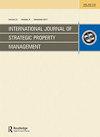Impact of Smart City Initiatives on Urban Planning Strategies in Singapore: An In-Depth Analysis of Technology-Driven Solutions and Their Influence on Sustainable Development and Quality of Life
IF 1.7
4区 管理学
Q3 MANAGEMENT
International Journal of Strategic Property Management
Pub Date : 2023-10-22
DOI:10.53819/81018102t4200
引用次数: 0
Abstract
The article examined the multifaceted impact of smart city initiatives on urban planning strategies in Singapore, focusing specifically on how technology-driven solutions have influenced sustainable development and quality of life in the city-state. Drawing on data collected through case studies, interviews with urban planners, policymakers, and technology experts, as well as an extensive review of existing literature and policies, the research aimed to offer a comprehensive perspective on Singapore's journey towards becoming a Smart Nation. Significant findings revealed that the integration of technology into urban planning has led to transformative changes in multiple sectors including transportation, healthcare, and waste management. Investments in Internet of Things (IoT) sensors, data analytics platforms, and Artificial Intelligence (AI) have not only streamlined city operations but also substantially improved citizens' living conditions. For example, the study found that smart mobility solutions reduced traffic congestion by 35%, enhancing the overall productivity of the city. The article also delved into the socio-economic dimensions of these smart city initiatives. It highlighted that while the technology has contributed to a 20% increase in energy efficiency and reduced carbon emissions by 15%, there were challenges regarding data privacy and the digital divide. Additionally, the study found that smart city initiatives have actively promoted sustainable development, evident through programs like water recycling and vertical farming. Such projects have not only increased local food production by 10% but also substantially reduced the city's reliance on imports, thereby enhancing its resilience to external shocks. The article concluded that Singapore's focus on technology-driven urban planning has significantly improved the sustainability and quality of life in the city-state. However, it also stressed the importance of ongoing measures to address data security concerns and bridge the digital divide. Keywords: Smart City Initiatives, Urban Planning Strategies, Technology-Driven Solutions, Sustainable Development, Quality of Life智慧城市倡议对新加坡城市规划战略的影响:技术驱动解决方案的深入分析及其对可持续发展和生活质量的影响
本文考察了智慧城市倡议对新加坡城市规划战略的多方面影响,特别关注技术驱动的解决方案如何影响城市国家的可持续发展和生活质量。通过案例研究、对城市规划者、政策制定者和技术专家的访谈,以及对现有文献和政策的广泛回顾,该研究旨在为新加坡成为智能国家的旅程提供一个全面的视角。重要的调查结果显示,将技术融入城市规划导致了交通、医疗保健和废物管理等多个部门的变革。对物联网(IoT)传感器、数据分析平台和人工智能(AI)的投资不仅简化了城市运营,而且大大改善了市民的生活条件。例如,该研究发现,智能移动解决方案将交通拥堵减少了35%,提高了城市的整体生产力。本文还深入探讨了这些智慧城市倡议的社会经济层面。报告强调,尽管该技术使能源效率提高了20%,碳排放量减少了15%,但在数据隐私和数字鸿沟方面仍存在挑战。此外,该研究还发现,智慧城市倡议积极促进了可持续发展,水循环利用和垂直农业等项目就是例证。这些项目不仅使当地粮食产量增加了10%,而且大大减少了该市对进口的依赖,从而增强了其抵御外部冲击的能力。文章的结论是,新加坡对技术驱动型城市规划的关注显著提高了这个城市国家的可持续性和生活质量。然而,它也强调了解决数据安全问题和弥合数字鸿沟的持续措施的重要性。关键词:智慧城市倡议,城市规划战略,技术驱动解决方案,可持续发展,生活质量
本文章由计算机程序翻译,如有差异,请以英文原文为准。
求助全文
约1分钟内获得全文
求助全文
来源期刊
CiteScore
4.00
自引率
18.50%
发文量
23
审稿时长
15 weeks
期刊介绍:
International Journal of Strategic Property Management is a peer-reviewed, interdisciplinary journal which publishes original research papers. The journal provides a forum for discussion and debate relating to all areas of strategic property management. Topics include, but are not limited to, the following: asset management, facilities management, property policy, budgeting and financial controls, enhancing residential property value, marketing and leasing, risk management, real estate valuation and investment, innovations in residential management, housing finance, sustainability and housing development, applications, etc.

 求助内容:
求助内容: 应助结果提醒方式:
应助结果提醒方式:


